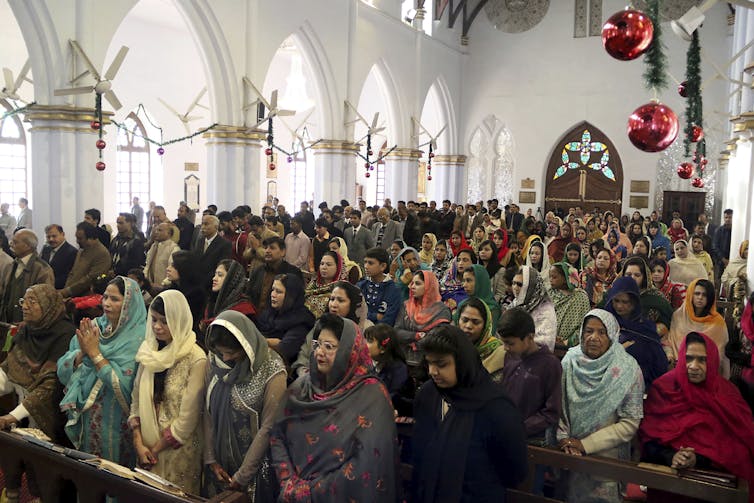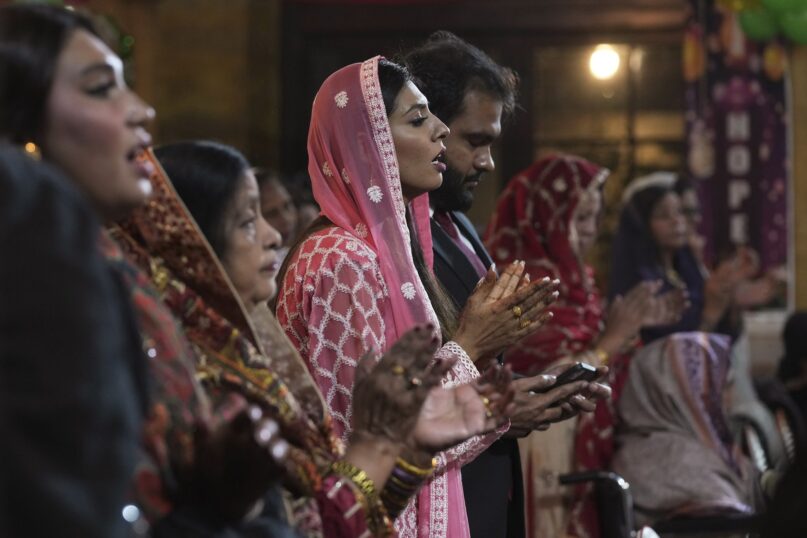(The Conversation) — Two Christian Pakistani teenagers, one 18 and another 14, were arrested in their homes in Lahore in May 2023 on charges of blasphemy after a policeman claimed he heard them being disrespectful of the Prophet Muhammad.
Among Muslim-majority countries, Pakistan has the strictest blasphemy laws. People jailed under these laws risk a sentence of life in prison and worse still, even death. Christians and other religious minorities make up a mere 4% of Pakistan’s population, but they account for about half of blasphemy charges.
As if navigating blasphemy laws weren’t hardship enough, Christians who live in major cities like Lahore are often relegated to poorly paid and hazardous jobs like sanitation work. The nation of Pakistan was created 76 years ago but during this time the lives of its Christian citizens have grown ever more difficult.
As a scholar of world religions, I have studied how the evolution of a hard-line version of Islam in Pakistan has come to shape this country’s national identity and contributed to the persecution of its Christian minority.
Hindu converts to Christianity
Many Christians in Pakistan trace their religious affiliation to the activities of missionary societies during the 19th and early 20th centuries in the Punjab region of what was then British-ruled India.
Early evangelization efforts by both the British and Americans in Hindu-majority India focused on upper-caste Hindus. The evangelizers assumed that these elites would use their influence to convert members of the lower castes. However, this approach led to few converts.
The caste system is a tiered socioeconomic system that consigns people to a particular group, or caste. In Hinduism, this system is part of its religious worldview. People are born into a particular caste.
There are some 3,000 castes in India, each associated with a range of occupations. People from the lowest castes are often expected to do work that is considered “polluting,” such as skinning animals, removing the bodies of the unclaimed dead and cleaning toilets. Because castes are rigid categories, their members are blocked from upward mobility.
In the late 19th century, American missionaries in India decided to focus directly on the least advantaged and began to baptize Hindus of low or no caste. The missionaries’ new approach proved successful, in part because conversion to Christianity offered hope of escape from Hinduism’s caste system. By the 1930s, for example, many members of the largest menial caste in India’s Punjab region had converted to Protestant Christianity.
In 1947, the country of Pakistan was carved out of Indian territory to establish a homeland for Muslims, who were a minority in India. The section of the Punjab where most Christians lived became part of Pakistan.
The majority of those Christians chose to remain in the newly created Pakistan. They believed that they would fare better there because, in principle, Islam rejects social divisions like castes on theological grounds.
Lower socioeconomic status

Pakistani Christian women attend the Christmas Mass at a church in Peshawar, Pakistan.
AP Photo/Mohammad Sajjad
In practice, after the creation of Pakistan, not much changed economically or socially for the Christians who stayed: The caste system continued to exist in the new country.
Even today, most Pakistani Christians living in major cities are consigned to poorly paid jobs in the sanitation industry. Pakistan’s government has adopted a systemic policy of reserving sanitation posts for religious minorities.
Newspaper ads for sanitation workers, including by government agencies, explicitly call for non-Muslims. One of Asia’s Catholic news agencies, UCANews, reported that in May 2017, the Hyderabad Municipal Corporation issued a call for 450 sanitation workers, offering contracts that required employees to be non-Muslim and to take this oath: “I swear by my faith that I will only work in the position of a sanitary worker and not refuse any work.”
In Pakistan’s northwest city of Peshawar, as many as 80% of Christians are sanitation workers. According to the 2022 census, 3.27% of urban Pakistanis living in Punjab province are Christian. However, in Lahore, Punjab’s capital city, Christians account for 76% of sanitation workers.
Subject to widespread discrimination, Christians are often refused other work. Confined to low-wage jobs, Christians experience widespread poverty, even in the relatively prosperous Punjab. A 2012 survey in Lahore found that, for Christian families of five, the average monthly income was US$138 — a per capita daily income of 92 cents – which is well below the poverty line defined by the World Bank. In contrast, during the same year, the average monthly income for all Pakistanis was US$255.
Blasphemy laws target minorities
The condition of Christians only worsened when Gen. Muhammad Zia-ul-Haq, Pakistan’s dictatorial president from 1978 to 1988, started the Islamization of the country.
Originally, for example, Pakistan’s blasphemy laws were general in nature. They punished offenders who wounded the religious sensibilities of other people. Only a handful of charges were filed until Zia added several Islam-specific clauses to this nonsectarian code. These changes included making blasphemy against the Prophet Muhammad punishable by a minimum sentence of life in prison, and possibly death. Since Zia’s rule, hundreds of blasphemy cases have been filed.
Anthropologist Linda Walbridge, writing about Pakistani Christians, notes that by the 1990s these “Christians certainly believed they were the targets of systematic oppression.” That oppression, she observed, came largely “in the form of laws that have increasingly been used against them.”
Indeed, laws intended to protect Islam have sometimes been used against Christians and other minorities to settle personal scores or business disputes. In one incident, a Christian couple refused to pay back their Muslim employer who had lent them money. A mob burned them alive after he accused them of blasphemy.
The father of one of the arrested teenagers told the The Christian Post, “Our Muslim neighbors have known us for years, and they know we would never indulge in anything that could hurt their religious sentiments.” Prosecuting authorities reviewing the teenagers’ case may lean in their favor, but if the past is any indication, the authorities themselves will face intimidation, threats and accusations.
This is an updated version of a piece first published on June 28, 2018.
(Myriam Renaud, Affiliated Faculty of Bioethics, Religion, and Society, Department of Religious Studies, DePaul University. The views expressed in this commentary do not necessarily reflect those of Religion News Service.)
![]()





